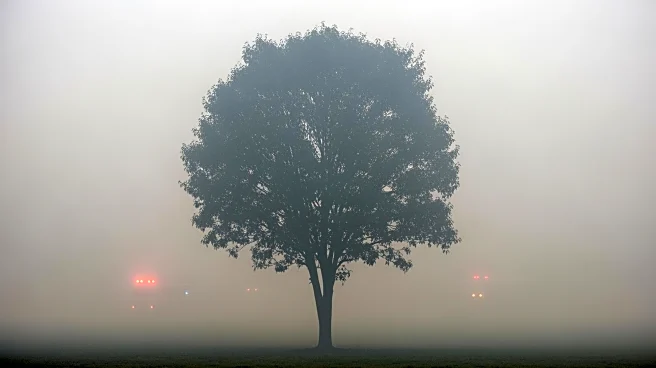What's Happening?
Following the Diwali celebrations, New Delhi has been enveloped in a thick, hazardous smog, with the Air Quality Index (AQI) reaching 360, indicating severe pollution levels. Despite a court directive
to use less-polluting 'green' fireworks, traditional crackers were widely used, exacerbating the city's pollution problem. The smog has significantly impacted visibility and daily activities, with residents expressing concerns over the air quality. The situation is further worsened by low wind speeds, vehicular emissions, and stubble burning from neighboring states. In response, officials have invoked the next stage of the Graded Response Action Plan (GRAP), imposing restrictions on diesel generators and the burning of coal and firewood to improve air quality.
Why It's Important?
The severe air pollution in Delhi poses significant health risks to its residents, with PM 2.5 levels far exceeding World Health Organization guidelines. The situation highlights the ongoing challenges in managing air quality in urban areas, particularly during festive seasons. The relaxation of rules around firecrackers may undermine efforts to raise awareness about air pollution dangers. The smog not only affects public health but also disrupts daily life and economic activities, potentially leading to increased healthcare costs and reduced productivity. The government's response to this crisis will be crucial in addressing both immediate and long-term environmental and health concerns.
What's Next?
Authorities are expected to continue monitoring air quality and may implement further restrictions if conditions do not improve. The effectiveness of the Graded Response Action Plan will be closely watched, and there may be calls for stricter enforcement of pollution control measures. Public pressure could lead to more stringent regulations on firecracker usage in future celebrations. Additionally, there may be increased advocacy for sustainable practices and policies to address the root causes of air pollution, including vehicular emissions and agricultural practices in neighboring states.
Beyond the Headlines
The current pollution crisis in Delhi underscores the broader environmental challenges faced by rapidly urbanizing regions. It raises ethical questions about balancing cultural traditions with public health and environmental sustainability. The situation may prompt discussions on the role of government and civil society in promoting eco-friendly practices and the need for comprehensive policy frameworks to tackle air pollution. Long-term shifts in public behavior and policy could be triggered by this event, potentially influencing future environmental legislation and urban planning strategies.









